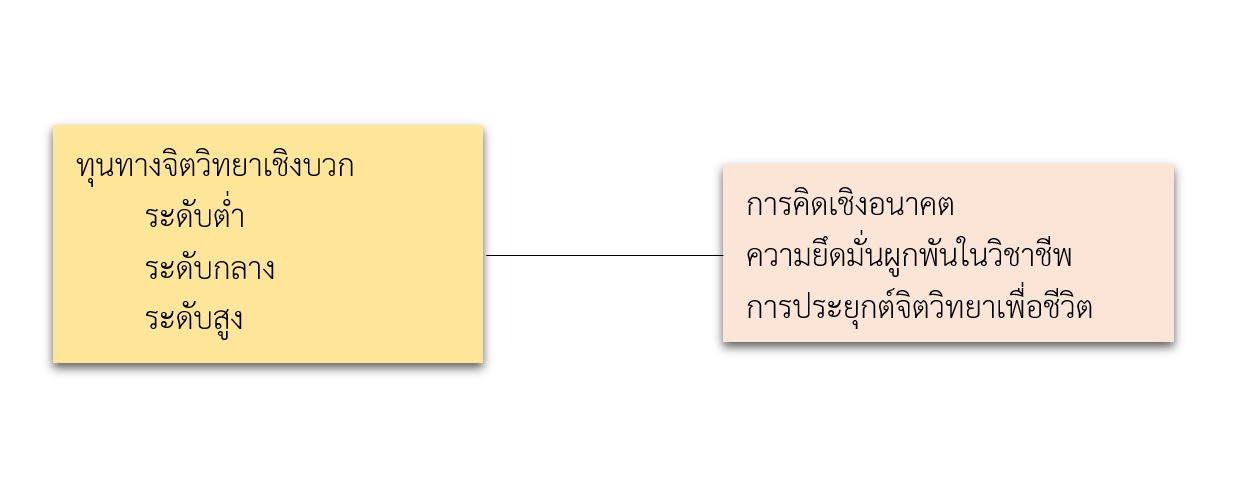ทุนทางจิตวิทยาเชิงบวก การคิดเชิงอนาคต ความยึดมั่นผูกพันในวิชาชีพ และการประยุกต์จิตวิทยาเพื่อชีวิตของนักศึกษา มหาวิทยาลัยสงขลานครินทร์
คำสำคัญ:
ทุนทางจิตวิทยาเชิงบวก, การคิดเชิงอนาคต, การประยุกต์จิตวิทยาเพื่อชีวิต, ความยึดมั่นผูกพันในวิชาชีพบทคัดย่อ
การวิจัยเชิงพรรณนานี้มีวัตถุประสงค์เพื่อศึกษา 1) ทุนทางจิตวิทยาเชิงบวก การคิดเชิงอนาคต ความยึดมั่นผูกพันในวิชาชีพ และการประยุกต์จิตวิทยาเพื่อชีวิตของนักศึกษา 2) ความสัมพันธ์ระหว่างทุนทางจิตวิทยาเชิงบวก กับการคิดเชิงอนาคต ความยึดมั่นผูกพันในวิชาชีพ และการประยุกต์จิตวิทยาเพื่อชีวิต 3) อิทธิพลของทุนทางจิตวิทยาเชิงบวกที่มีต่อการคิดเชิงอนาคต ความยึดมั่นผูกพันในวิชาชีพและการประยุกต์จิตวิทยาเพื่อชีวิต กลุ่มตัวอย่าง คือ นักศึกษาคณะศึกษาศาสตร์ มหาวิทยาลัยสงขลานครินทร์ จำนวน 165 คน ปีการศึกษา 2562 เครื่องมือที่ใช้ คือ แบบประเมินทุนทางจิตวิทยาเชิงบวก การคิดเชิงอนาคต ความยึดมั่นผูกพันในวิชาชีพและการประยุกต์จิตวิทยาเพื่อชีวิตที่มีค่า IOC ระหว่าง .67-1.00 และมีค่าความเชื่อมั่นสัมประสิทธิ์แอลฟ่าของครอนบาค เท่ากับ .947, .941, .944 และ .964 ตามลำดับ วิเคราะห์ข้อมูลโดยใช้สถิติเชิงพรรณนา, ค่าสัมประสิทธิ์สหสัมพันธ์ของเพียร์สัน และความแปรปรวนพหุคูณทางเดียว (One Way MANOVA) พบว่า
1. ทุนทางจิตวิทยาทางบวกของนักศึกษาอยู่ในระดับสูง (M=3.76, SD=0.60) การคิดเชิงอนาคตอยู่ในระดับปานกลาง (M=3.46, SD=0.39) ความยึดมั่นผูกพันในวิชาชีพ อยู่ในระดับสูง (M=3.52, SD=0.39) การประยุกต์จิตวิทยาเพื่อชีวิต อยู่ในระดับสูง (M=3.76, SD= 0.46)
2. ทุนทางจิตวิทยาเชิงบวก มีความสัมพันธ์ทางบวกในระดับต่ำ กับการคิดเชิงอนาคต (r=.220) ความยึดมั่นผูกพันในวิชาชีพ (r=.359) และการประยุกต์จิตวิทยาเพื่อชีวิต (r=.378) มีอย่างมีนัยสําคัญทางสถิติที่ระดับ .01
3. ทุนทางจิตวิทยาเชิงบวกระดับสูงมีผลต่อตัวแปรทั้งสามอย่างมีนัยสำคัญทางสถิติมากกว่าทุนทางจิตวิทยาเชิงบวกระดับต่ำ กล่าวคือ การคิดเชิงอนาคต (.01) ความยึดมั่นผูกพันในวิชาชีพ (.001) และการประยุกต์จิตวิทยาเพื่อชีวิต (.001)
สถานศึกษาควรส่งเสริมพัฒนาทุนทางจิตวิทยาเชิงบวกที่เป็นดุจอริยทรัพย์ให้แก่ผู้เรียน เพราะยิ่งผู้เรียนมีทุนทางจิตวิทยาเชิงบวกมากเพียงใด ก็จะยิ่งมีการคิดเชิงอนาคต และความยึดมั่นผูกพันในวิชาชีพมากเพียงนั้น
เอกสารอ้างอิง
Abbas, M., & Raja, U. (2011). Impact of Psychological Capital on Innovative Performance and Job Stress, Canadian Journal of Administrative Sciences, 32(2), 73-140. DOI: 10.1002/cjas.1314.
Bandura, A. (1997). Self-Efficacy: The Exercise of Control. New York: W.H. Freeman and Company.
Buck, C., & Robertson, J. (2008). Positive Psychology and Student Engagement. Journal of Cross-Disciplinary Perspectives in Education, 1(1), 28-35.
Chen, X., Zeng, G., Chang, E., & Cheung, H. Y. (2019). What Are the Potential Predictors of Psychological Capital for Chinese Primary School Teachers. Front. Educ, 4(50), 1-8. | doi.org/10.3389/feduc.2019.00050
Choochom, O. (2016). A Causal Relationship Model of Teachers’ Work Engagement. International Journal of Behavioral Science, 11(2), 143-152.
Cronbach, J. (1951). Coefficient Alpha and the Internal Structure of Tests. Psychometrika, 16(3), 297-334.
Harinpolsiti, B., Srisawat, P., & Voracharoensri, S. (2018). The Enhancement of Positive Psychology Capital of Vocational Students Through Rational Emotive Behavior Group Counseling. Journal of Industrial Education, Faculty of Education, Srinakharinwirot University, 12(1), 56-73. (in Thai)
Hinkle, E. (1998). Applied Statistics for the Behavioral Sciences. New Delhi: India Book Store.
Kaowsomboon, W. (2015). Factors Influenced the Decision to Study the Graduate Level at Thaksin University. Retrieved December 5, 2020 from http://www.tsu.ac.th/grad/report_/files/06044949200949.doc. (in Thai)
Kuha, A. (2019). Psychology for Daily Life (3rd). Songkhla: Neopoint (1995). (in Thai)
Larson, M., & Luthans, F. (2006). Potential Added Value of Psychological Capital in Predicting Work Attitudes. Journal of Leadership & Organizational Studies, 13(2), 75-92.
Luthans, F., Avolio, J., Avey, B., & Norman, M. (2007). Positive Psychological Capital: Measurement and Relationship with Performance and Satisfaction. Personnel Psychology, 60, 541-572.
Meesan, N. (2014). Institutional Commitment of Students in Dhurakij Pundit University. Suthiparithat, 28(88), 255-270. (in Thai)
Moonkum, S. (2010). Strategy of Analysis Teaching. (5th Ed.). Bangkok: Pappim. (in Thai)
Pawawimon, A. (2016). Cooperative and Work, Integrated Education, Smart Graduate. Retrieved December 25, 2020 from http://wil.crru.ac.th/files/Dr.Aorasa.pdf (in Thai)
Poohongthong, J. (2018). Transformative Learning, Teaching, Higher Education. Journal of Behavioral Science, 24(1), 163-182. (in Thai)
Prakmuong, S. (1997). Satisfaction of Teacher and Students Toward Educational Reform Agriculture for Life in Agricultural Technology College in Southern Region. M.A.Thesis. Prince of Songkla University. (in Thai)
Rew. L. (2005). Adolescent Health: A Multidesciplinary Approach to Theory Research and Intervention. USA: Sage Publications.
Rojsongkram, S. (2010). Factors Relating to the Participation in Activities of Mahidol University International College Students. Retrieved 2 November 5, 2020 from
http://www.sure.su.ac.th:8080/xmlui/handle/123456789/9632 (in Thai)
Schaufeli, B., & Bakker, B. (2010). “Defining and Measuring Work Engagement: Bringing Clarity to the Concept”. In A. B. Bakker (Ed.) & M. P. Leiter, Work engagement: A Handbook of Essential Theory and Research. Psychology Press.
Schaufeli, W., Salanova, M., González-Romá, V., & Bakker, A. (2002). The Measurement of Engagement and Burnout: A Two Sample Confirmatory Factor Analytic Approach. Journal of Happiness Studies, 3, 71-92.
Srisawat, P. (2015). A Study and Enhancement of Psychological Capital of University Students Through Group Counseling. Jr of Educational Research Srinakharinwirot University, 9(2), 131-146. (in Thai)
Tantiwiwat, S. (2017). Positive Psychology Capital: Development Implication and Challenging. Journal of Behavioral Science for Development, 9(1), 277-290. (in Thai)
Tongkittipaporn, J. (2013). General Psychology. Bangkok: Chulalongkorn University Press. (in Thai)
Trubprawong, K. (2013). Hunanization: is it Absolute? Executive Journal, 33(2), 26-34.
Vanichbancha, K. (2009). Advanced Statistical Analysis with SPSS for Window (7th ed.). Bangkok, Thailand: Chulalongkorn University Book Center. (in Thai).
Vanno, V. (2018). Needs Assessment of Academic Positive Psychology Capital of Thai University Students. Journal of Humanities, 40(2), 74-83. (in Thai)
Wehmeyer, L. (1986). Futuristics. New York: A Growth Company.
Wongkumsin, T. (2018). Positive Psychological Capital, Psychological, Well-Being and Professional Engagement of Government Teachers under the Bangkok Metropolitan Administration School. Jr of Social Science and Humanities, 44(2), 211-248. (in Thai)
Yalcin, S. (2016). Analyzing the Relationship Between Positive Psychological Capital and Organizational Commitment of the Teachers. International Education Studies, 9(8), 20.

ดาวน์โหลด
เผยแพร่แล้ว
ฉบับ
ประเภทบทความ
สัญญาอนุญาต
1. บทความหรือข้อคิดเห็นใด ๆ ที่ปรากฏในวารสารเครือข่าย วิทยาลัยพยาบาลและการสาธารณสุขภาคใต้ ที่เป็นวรรณกรรมของผู้เขียน บรรณาธิการหรือเครือข่ายวิทยาลัยพยาบาลและวิทยาลัยการสาธารณสุขภาคใต้ ไม่จำเป็นต้องเห็นด้วย
2. บทความที่ได้รับการตีพิมพ์ถือเป็นลิขสิทธิ์ของ วารสารเครือข่ายวิทยาลัยพยาบาลและการสาธารณสุขภาคใต้







